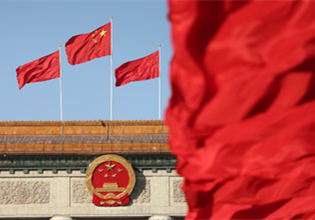An idyllic stage
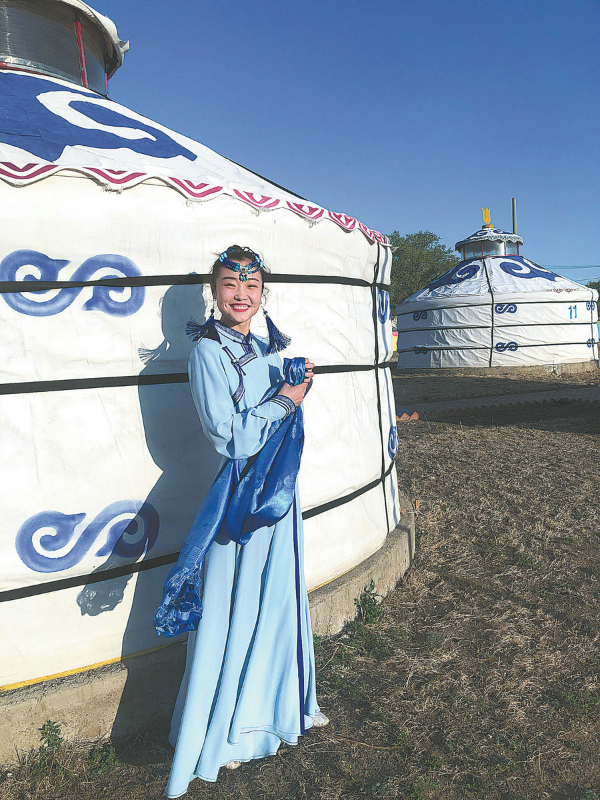
Guo Wen, an Ulan Muqir dancer from Horqin Right Wing Middle Banner, on a television show in 2019. [Photo provided to China Daily]
Guo Wen grew up listening to stories about Ulan Muqir because her mother toured with the art troupe from Horqin Right Wing Middle Banner as a dancer.
Ulan Muqir means "red bud" in Mongolian, and is a collection of art troupes. They travel from one place to another performing for herders who live in some of China's most remote areas.
Usually the performances feature singers, dancers and instrumentalists, as well as actors and actresses playing short skits, which are about local heroes either adapted from folklore or based on real stories.
"My mother toured with the art troupe since she was a teenager. She often toured for weeks and after she returned home, my younger sister and I were eager to listen to the stories of those tours," recalls Guo, 25, who was born and raised on the Horqin grasslands, Hinggan League, which lies in eastern Inner Mongolia autonomous region.
Her mother is a member of the country's ethnic Mongolian community and her father is Han.
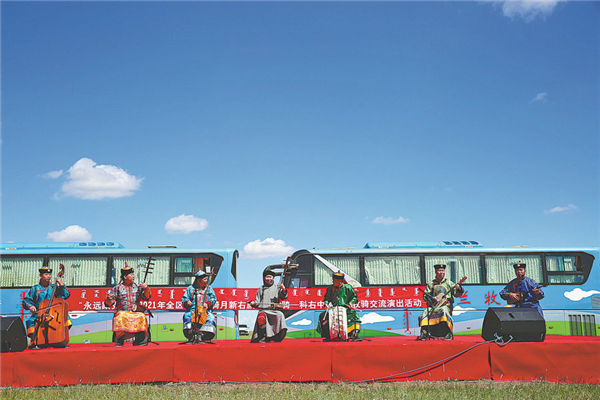
Musicians of Ulan Muqir troupes from Horqin Right Wing Middle Banner and Xin Barga Right Banner perform last year. [Photo provided to China Daily]
One of the stories Guo and her younger sister loved was about her mother touring with the art troupe in a remote village. It was about 30 years ago when living conditions were not so good there. Usually, shows started after the herders finished their work. There was no electricity so the members of the troupe made a torch by using stripes of cloth as a wick. There were only seven families in the village. Guo's mother and her colleagues wondered how many people would come to their show. They were happy to see that all of the families gathered around and enjoyed their performances.
One of the villagers, an elderly man, held the hands of Guo's mother and told her how much he had enjoyed her dance.
"You must be tired to travel so far to perform here. We really appreciate it," he told Guo's mother.
"For my mother, who was a young dancer and joined the art troupe not long ago, it was an unforgettable experience and she was touched," says Guo. Her mother has been dancing with the troupe for nearly 40 years, and now at 53, she has become a teacher who trains young dancers.
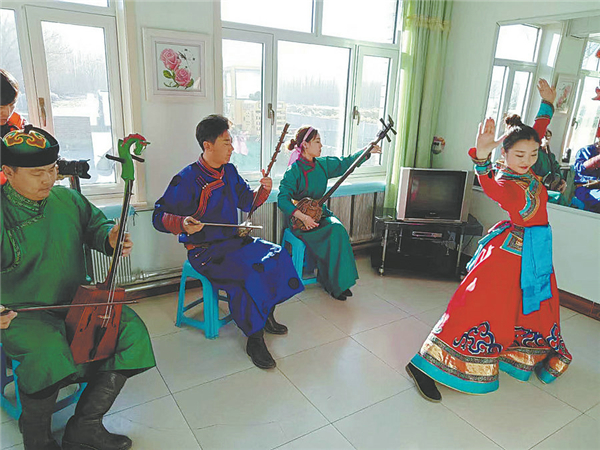
Guo (right) dances in a nursing home. [Photo provided to China Daily]
Guo was so captivated by her mother's stories that the idea of becoming a dancer herself took root in her heart.
In 2010, as a dancer, Guo joined the same troupe as her mother, the Ulan Muqir of Horqin Right Wing Middle Banner. Besides performing as a dancer, Guo also plays khuvis (Mongolian plucked stringed instrument), works as the shows' host, writes scripts and acts. In early May, she was awarded the Hinggan League Youth May Fourth Medal for her promotion of the art troupe.
"My mother trained me to become a dancer and she was very proud and excited about me joining the Ulan Muqir of Horqin Right Wing Middle Banner," says Guo. "Some of the dance pieces that I perform nowadays were also danced by my mother decades ago. It is like a family legacy that I am keeping on."
The Ulan Muqir of Horqin Right Wing Middle Banner, founded in 1965, gives about 100 shows a year, touring villages. The troupe also performs at schools and nursing homes for elderly people.
Guo says when she toured with the troupe, she experienced similar situations like what her mother told in her stories.
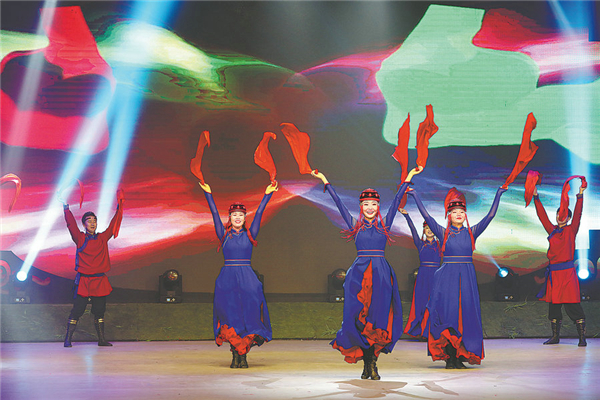
Guo Wen (middle) and her colleagues perform during the Spring Festival Gala in the Horqin Right Wing Middle Banner. [Photo provided to China Daily]
"Now, the condition of the art troupe is much better compared to decades ago. Back then, my mother toured by riding horses and now we tour by bus. During power cuts, the villagers would turn up their car lights to shed light on the stage for us," says Guo.
"We've made lots of friends with the local people. They treated us like guests with hospitality and delicious food.
"Some of our shows are staged at indoor venues, like theaters, but most of the time we tour and perform outdoors, with the blue sky as our curtain and the grassland as our stage. The audiences sit casually on grass. We are sometimes so close that my dress touches them when I spin."
According to Zhang Xueke, director of the Ulan Muqir of Horqin Right Wing Middle Banner, there are about 70 members in the troupe, with 45 percent being people born after 1990, like Guo.
"These young people have brought their fresh ideas and creativity to the development of the art troupe. They have created many new performances, based on the daily lives of Mongolian people, as well as composed new songs combining Mongolian folk songs and contemporary music elements," says Zhang, adding that the young performers have been promoting the history and culture of Ulan Muqir on social media, which had led to the art troupe gaining more than 1 million followers online.
Zhang, 42, joined the Ulan Muqir of Horqin Right Wing Middle Banner in 1997 as a dancer. Like Guo, he was influenced and inspired by his family to become a member of the troupe.
"My uncle was a dancer with the art troupe and I decided to become a dancer like him after watching his performance when I was 7 years old. The dance piece was very happy and fast-paced. I couldn't help imitating my uncle's movements back then," recalls Zhang.
The history of Ulan Muqir dates back to the Sonid Right Banner in Xilin Gol League, where the first Ulan Muqir troupe was formed on June 17, 1957. Now, there are 75 Ulan Muqir troupes in Inner Mongolia, bringing 7,000 performances to audiences in the region each year.
In 2017, performers of the Sonid Right Banner Ulan Muqir troupe wrote to President Xi Jinping, reviewing its history during the past six decades, as well as expressing their commitment to the development of the troupe. In the letter that Xi wrote back, he called on its members to preserve the tradition of Ulan Muqir and promote artistic innovation.
"In the new era, I hope you can carry forward the fine tradition of Ulan Muqir, and keep on serving the herdsmen," Xi wrote in the letter.



 Print
Print Mail
Mail
